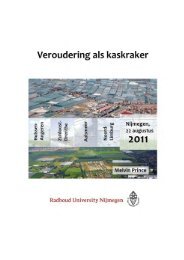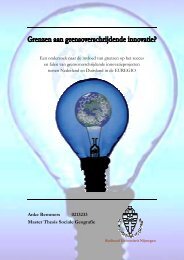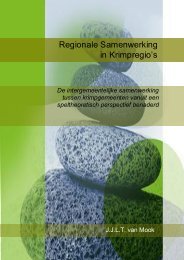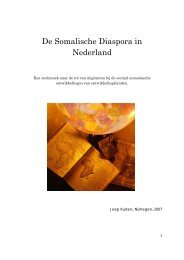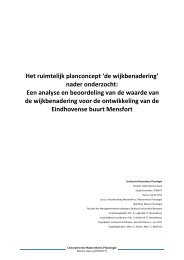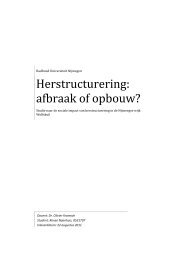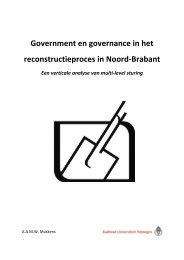Trading with the enemy in Mitrovica, Kosovo. - RUhosting
Trading with the enemy in Mitrovica, Kosovo. - RUhosting
Trading with the enemy in Mitrovica, Kosovo. - RUhosting
Create successful ePaper yourself
Turn your PDF publications into a flip-book with our unique Google optimized e-Paper software.
Ano<strong>the</strong>r important reason why reconciliation programmes have not achieved results is because of <strong>the</strong> current<br />
political climate (respondent #13, #14, #17). “Reconciliation is impossible <strong>with</strong> <strong>the</strong> current political climate.<br />
There are millions little cases of reconciliation, but <strong>the</strong>n Belgrade steps <strong>in</strong> and says “All Albanians are our<br />
enemies”” (respondent #17). Especially <strong>in</strong> <strong>Mitrovica</strong> reconciliation is very difficult, if not impossible. Some<br />
people say it would be better to work on improv<strong>in</strong>g <strong>in</strong>ter-ethnic relations <strong>in</strong> <strong>the</strong> enclaves (respondent #3,<br />
#16). “I don't believe <strong>in</strong> reconciliation <strong>in</strong> <strong>Mitrovica</strong>. To achieve someth<strong>in</strong>g you have to work <strong>in</strong> less volatile<br />
environments. In 2004 is was better <strong>in</strong> <strong>Mitrovica</strong> <strong>the</strong>n now” (Respondent #13). It became worse <strong>in</strong> <strong>Mitrovica</strong><br />
because of <strong>the</strong> riots <strong>in</strong> 2004, because of <strong>the</strong> <strong>in</strong>dependence and because Serbs feel <strong>the</strong>mselves more and more<br />
be<strong>in</strong>g under threat (respondent #13). “The <strong>in</strong>dependence set us back 5 years: Serbs said “I will never believe<br />
<strong>in</strong> <strong>Kosovo</strong> aga<strong>in</strong>”” (respondent #14).<br />
The most simple and most extreme explanation for <strong>the</strong> lack of success of reconciliation efforts was given by<br />
respondent #16 who believes reconciliation programmes are not work<strong>in</strong>g because <strong>the</strong>ir goal is not realistic:<br />
that creat<strong>in</strong>g an <strong>in</strong>tegrated society <strong>in</strong> <strong>Kosovo</strong> <strong>with</strong> Albanians and Serbs hav<strong>in</strong>g contact is impossible because<br />
it's a myth that never really existed.<br />
In short, this paragraph has established that reconciliation and improv<strong>in</strong>g <strong>in</strong>ter-ethnic relations is deemed to<br />
be very important for a better and more peaceful future of <strong>Kosovo</strong>. But reconciliation programmes –<br />
specifically aimed at this task – have proven not to be successful so far. On top of that <strong>the</strong> local population<br />
has a very negative attitude regard<strong>in</strong>g those programmes, or at <strong>the</strong> very least has no real <strong>in</strong>terest <strong>in</strong> <strong>the</strong>m.<br />
This is an obvious problem, <strong>Kosovo</strong> has a 'disease' but <strong>the</strong> 'cure' does not work.<br />
The <strong>in</strong>habitants of <strong>the</strong> Balkans have a reputation of be<strong>in</strong>g very focussed on <strong>the</strong>ir history, at least that's <strong>the</strong><br />
stereotype. Several times it was mentioned to me that perhaps Europeans should look a bit more at <strong>the</strong>ir own<br />
history because it might hold some useful <strong>in</strong>formation: people po<strong>in</strong>ted out how Europe did not have any<br />
reconciliation programmes but still was able to reconcile after <strong>the</strong> biggest war history had ever seen (field<br />
notes, respondent #2, #13). Europe had someth<strong>in</strong>g <strong>in</strong>stead of reconciliation programmes though: economic<br />
<strong>in</strong>terest.<br />
5.3. A fail<strong>in</strong>g economy makes peace more difficult.<br />
There is a strong l<strong>in</strong>k between economic development and <strong>in</strong>ter-ethnic relations accord<strong>in</strong>g both to <strong>the</strong>ory and<br />
my <strong>in</strong>terviews. As it has been discussed <strong>in</strong> <strong>the</strong> previous chapter how <strong>Kosovo</strong>'s economy is perform<strong>in</strong>g poorly<br />
and especially <strong>the</strong> unemployment rate is dramatic, this doesn't bode well for <strong>Kosovo</strong>'s <strong>in</strong>ter-ethnic relations. I<br />
never asked questions specifically about <strong>the</strong> general economic development or its relation to <strong>in</strong>ter-ethnicity<br />
dur<strong>in</strong>g my <strong>in</strong>terviews but many people started talk<strong>in</strong>g about <strong>the</strong> economy regardless of this. The views of <strong>the</strong><br />
58




